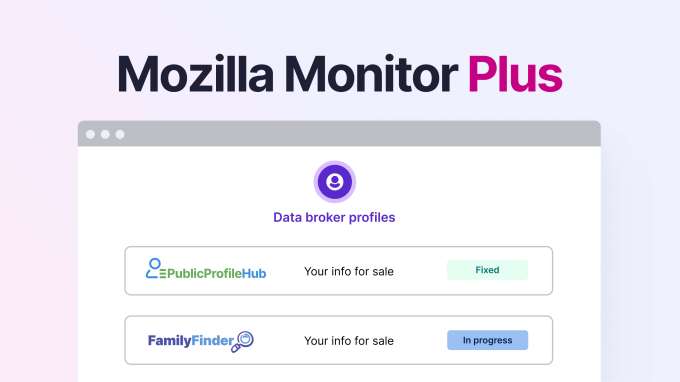Mozilla today is introducing a new subscription service that will help people locate and remove their personal and sensitive information from data broker websites around the web. This includes the ability to remove your phone number, email, home address and other information that is exposed on data broker websites and sold for profit, the company says.
The new subscription-based service is being offered as part of Mozilla Monitor (previously Firefox Monitor), originally a free service that notifies you when your email has been a part of a data breach. The newly added and optional subscription, Monitor Plus, will allow the over 10 million existing Mozilla Monitor users to run scans to see if their personal information has been leaked, and then provide users with tools to help make that information private again.
Currently, the process of getting information removed from data broker websites can be convoluted and confusing. Most sites have an opt-out page where you can fill out a form to request your information’s removal, or you can contact the broker directly to request this. But people often don’t know who has their information or how to go about the process of getting it removed once they find it online.

Mozilla Monitor aims to make this process easier by proactively searching across 190 data broker sites that are known to sell people’s personal and private information. If it discovers data you’ve provided to Mozilla — like your name, location and birthdate — on any of these sites, it will initiate the request for removal on your behalf. The process can take a day or up to a month, Mozilla notes. This feature is a part of the new Monitor Plus $13.99 per month subscription, which lowers to $8.99 per month if buying an annual subscription ($107.88/year).
Free users will instead have the option of a one-time scan of data broker sites but will have to go through the steps to remove their information manually. This could potentially help upsell them to the new subscription service, as it offers automatic removals for this otherwise painstaking process. Both free and paid users will also continue to get alerts about data breaches, as before, and be offered tools to fix those breaches that are high-risk.
“When we launched Monitor, our goal was to help people discover where their personal info may have been exposed. Now, with Monitor Plus, we’ll help people take back their exposed data from data broker sites that are trying to sell it,” explained Tony Amaral-Cinotto, Product Manager of Mozilla Monitor at Mozilla, in a launch announcement. “Our long-standing commitment to put people’s needs first and our easy step-by-step process makes Monitor Plus unique. Additionally, we combine breach alerts and data broker removal to offer an all-in-one protection tool and make it easier for people to feel and be safe online,” he added.
To initiate a scan, users provide Mozilla with their first and last name, current city and state, date of birth and email. This information is encrypted and follows Mozilla’s privacy policy. Using this information, Mozilla runs a scan that shows you where your personal information is exposed, including through data breaches and brokers’ sites. The company notes that 233 million people were impacted by data breaches in 2023 alone, making such a tool a necessity these days.
Mozilla Monitor Plus subscribers will benefit from monthly scans and automatic removals. The free scan and paid service will initially be offered to users in the U.S. only, the company says.































Comment